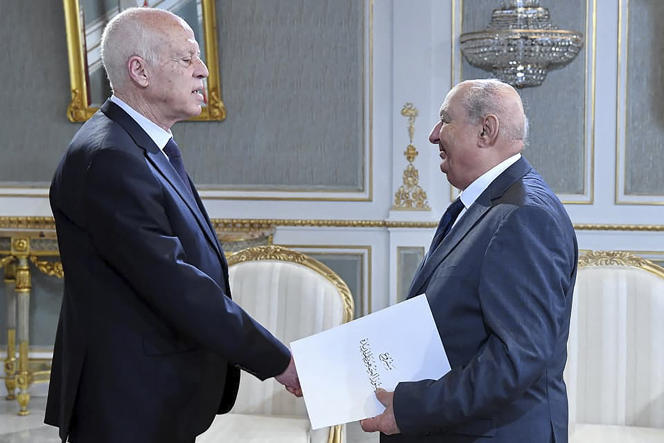It is a bit the end of illusions for a fringe of Tunisian opinion – in particular the liberal elite – who had given Kaïs Saïed the benefit of the doubt. The draft new Constitution that the Head of State made public on Thursday, June 30, unambiguously installs an autocratic hyper-presidentialism without taking into account certain locks that had been considered by the advisory commission appointed by Mr. Saïed himself. same.
Sadok Belaïd, the president of this commission, supposed to provide the process with the appearance of a “dialogue”, curtly disavowed, Sunday, July 3, in an interview with Le Monde the presidential text, which he considers “dangerous”. Using very harsh words commensurate with his spite at having been cheated, Mr. Belaïd, former dean of the Faculty of Legal Sciences in Tunis, evokes the triple risk of a “dictatorship”, of the “reconstitution of the power of the religious” and a “fragmentation” attacking the “unity” of the country.
The campaign for the July 25 referendum, which will submit the presidential project to the popular vote, could not start in more confused conditions. The political crisis is deepening in Tunisia, almost a year after the coup of July 25, 2021 in favor of which Mr. Saïed had assumed full powers by establishing an exceptional regime. The Head of State, who had never made a secret of his rejection of a representative democracy confiscating in his eyes the suffrage of the people, persists in wanting to impose his model of institutional architecture without any consultation. Dubbed “building democracy from below”, the latter claims to anchor the legitimacy of power at the local level by gutting the National Assembly and granting full executive power to an omnipotent presidency.
“Disclaimer”
One of the most contentious aspects of Mr. Saïed’s project is indeed, according to Mr. Belaïd, the “non-responsibility” of the head of state. The former chairman of the advisory commission had provided in his preliminary draft for a dismissal mechanism – in the event that the president dismisses the government twice – which disappeared in the version validated by Mr. Saïed. The latter also gives him the possibility of remaining in power at the end of his term in the event of “imminent peril”, a privilege which in Mr. Belaïd’s eyes runs the risk of an “endless dictatorship of the current president”. “.
Another controversial point concerns the place of Islam in the Constitution. Article 5 of the presidential draft states that “Tunisia is part of the Islamic Umma [the community of believers]. Only the state will have to ensure that the objectives of Islam are guaranteed”. Such a provision, according to Mr. Belaïd, could authorize the “return to the dark ages of Islamic civilization” and therefore “religious extremism”. Mr. Belaïd finally believes that the creation of a new regional level endowed with important economic prerogatives and poorly harmonized with the national framework runs the risk of seeing “regionalism one day or another predominate and contribute to fracturing the country” .
The reactions of the political parties were rather lukewarm the day after the publication of the presidential text, except for the Free Destourian Party (PDL), an anti-Islamist formation claiming to be part of the heritage of Habib Bourguiba. Its president, Abir Moussi, denounces a “Constitution which violates the power of the people”. The Islamo-conservative Ennahda party, which since July 25, 2021 has castigated Mr. Saïed’s “coup d’etat”, has for its part maintained silence, probably preferring to leave the head of state to get bogged down alone. “Ennahda’s silence is well studied and strategic, because the party sees that the president’s house of cards is collapsing, decodes political scientist and consultant Selim Kharrat. He lets things rot. »
The powerful union center of the Tunisian General Labor Union (UGTT), which had refused to associate itself with the advisory commission of Mr. Belaïd, for its part left its members free of their choice during the referendum of July 25.
On the other hand, the reactions are multiple and generally rather negative among lawyers and a significant section of civil society. “The process that Kaïs Saïed has initiated is illegal, illegitimate, accuses Jawhar Ben Mbarek, one of the leaders of the Citizens against the Coup d’Etat coordination. It is a usurpation of power, the Constitution confirms the establishment of a dictatorship. »
“Sharia rules”
Article 5 on the “Islamic Ummah” in particular raises many concerns. This is “a great blow to the nation-state, which is denied, and to the civilian character of the state, alarmed the jurist Chedly Mamoghli. This paves the way for retrograde political and societal changes.” “We are no longer in a human rights repository, also says Islamic scholar Amel Grami. It is the rules of Sharia that will be applied and it is a real regression. »
These new constitutional principles could thus feed prejudicial prejudicial to the rights of women. “The majority of judges are quite conservative,” says Ms. Grami. We know this because we have experienced problematic legal situations with the question of women’s rights where the texts were interpreted in an ideological way, in particular on morals. »
The sham dialogue around the draft new Constitution, illustrated by the advisory commission of Mr. Belaïd whose opinions were ignored, also arouses many critical comments. “We are really in deception and hypocrisy, because he did not have the honesty to say that the Constitution which would be adopted would be his, deplores political scientist Hatem M’rad. He won’t back down. He is a man who does as he pleases. He will face the referendum at his peril. »
“A lot of people had confidence in Sadok Belaïd and they are therefore surprised by what happened,” adds Mr. M’rad. In reality, this confirms the whole process since July 25, 2021: a coup d’etat where everything is done unilaterally. »
The big question that now divides political parties, associations and circles of intellectuals hostile to Mr. Saïed is whether to boycott the July 25 referendum, because of the questionable procedure that preceded it, or whether to participate by voting “no”. The most optimistic argue that a massive mobilization of the “no” camp could abort the head of state’s project. However, article 139 of Mr. Saïed’s draft provides that the Constitution comes into force as soon as the results are announced by the electoral commission, without specifying that the text must obtain a majority of positive votes or even that a minimum threshold of participation is required to validate these results. In short, the referendum would only be an exercise in the ratification of a project destined to apply in any case. An article that gives the measure of the will of the Head of State to go through with force.

















